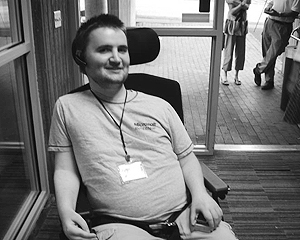Intern to Employee (AccessComputing News Feb 2009)

I graduated last year from the UW with a degree in computer science. I have muscular dystrophy, which is a genetic disease that weakens muscles, and I now use a power wheelchair. During high school, I became a DO-IT Scholar. This program promotes the use of technology to prepare youth with disabilities for higher education and careers, particularly those in high-tech fields. Through DO-IT Scholars, I participated in academic summer programs at the UW, engaged in an electronic community of peers and mentors, and learned about internships and other opportunities.
As a DO-IT Scholar, I took part in a several video conferences with educators in Japan. I was invited to lecture at the first DO-IT Japan Scholars program in 2007, where I shared personal experiences and insights.
While in high school and college, I had a number of tech-related internship experiences in government agencies and large corporations. In 2004, I was a high school intern at Microsoft. This was my first real work experience. The following summer, I worked in the human resources department of a telephone company's call center. In 2006, I was selected as a federal IT intern by the American Association of People with Disabilities. This opportunity took me to Washington, D.C. where I worked in the Department of Commerce. During the summer of 2007, I was back working with Microsoft on the SharePoint team. Toward the end of this internship, I was invited to return as an employee. I am currently a Microsoft employee (after taking some time off for fun after graduation in late summer 2008). My main accommodations at work are an adjustable work station and assistive technology so I can operate a computer.
I am also a United States Business Leadership Network (USBLN) Student Advisory Council Member. I have participated in the past two USBLN national conferences in Florida and Oregon. As a USBLN council member I hope to share what I have learned about preparing for and succeeding in my computing career.
Research shows that students with disabilities who participate in work-based learning experiences are more successful than their peers who do not. Internships, job shadows, informational interviews, and other work-based learning experiences help students:
- pay for their education and gain academic credit
- develop job-searching skills, resumes, and cover letters
- clarify academic and career interests
- broaden human relation skills through interaction with co-workers
- gain exposure to specialized facilities not available on campus
- expand their list of contacts for employment after graduation
- practice disclosing their disability and requesting accommodations
For more information about the value of work-based learning, read the DO-IT publication It's Your Career: Work-Based Learning Opportunities for College Students with Disabilities at www.washington.edu/doit/its-your-career-work-based-learning-opportunities-college-students-disabilities.
Postsecondary students with disabilities can request assistance in locating internships in high-tech fields by contacting AccessComputing staff at accesscomp@u.washington.edu.